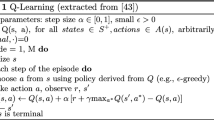Abstract
Serious games present a noteworthy research area for artificial intelligence, where automated adaptation and reasonable NPC behaviour present essential challenges. Deep reinforcement learning has already been successfully applied to game-playing. We aim to expand and improve the application of deep learning methods in SGs through investigating their architectural properties and respective application scenarios. In this paper, we examine promising architectures and conduct first experiments concerning CNN design and analysis for game-playing. Although precise statements about the applicability of different architectures are not yet possible, our findings allow for concluding some general recommendations for the choice of DL architectures in different scenarios. Furthermore, we point out promising prospects for further research.
Access this chapter
Tax calculation will be finalised at checkout
Purchases are for personal use only
Similar content being viewed by others
References
Brisson, A., Pereira, G., Prada, R., Paiva, A., Louchart, S., Suttie, N., Lim, T., Lopes, R., Bidarra, R., Bellotti, F., et al.: Artificial intelligence and personalization opportunities for serious games. In: Eighth AIIDE Conference, vol. 2012, pp. 51–57 (2012)
Dobrovsky, A., Borghoff, U.M., Hofmann, M.: Applying and augmenting deep reinforcement learning in serious games through interaction. Periodica Polytech. Electr. Eng. Comput. Sci. 61(2), 198–208 (2017). https://doi.org/10.3311/PPee.10313. ISSN 2064-5279
Doujak, G.: Serious Games und Digital Game Based Learning. Spielebasierte E-Learning Trends der Zukunft. GRIN Verlag, Munich (2015)
Goodfellow, I., Bengio, Y., Courville, A.: Deep Learning. Adaptive Computation and Machine Learning Series. MIT Press, Cambrige (2017)
Goodfellow, I.J.: NIPS 2016 tutorial: generative adversarial networks. CoRR abs/1701.00160 (2017). http://arxiv.org/abs/1701.00160
Hahn, P.: Visualisierung von Convolutional Neural Networks. Bachelorarbeit, Universität der Bundeswehr München (2017)
Harley, A.W.: An interactive node-link visualization of convolutional neural networks. In: Bebis, G., et al. (eds.) ISVC 2015. LNCS, vol. 9474, pp. 867–877. Springer, Cham (2015). https://doi.org/10.1007/978-3-319-27857-5_77
Krizhevsky, A., Sutskever, I., Hinton, G.E.: Imagenet classification with deep convolutional neural networks. In: Pereira, F., Burges, C.J.C., Bottou, L., Weinberger, K.Q. (eds.) Advances in Neural Information Processing Systems 25, pp. 1097–1105. Curran Associates, Inc. (2012)
Lample, G., Chaplot, D.S.: Playing FPS games with deep reinforcement learning. arXiv preprint arXiv:1609.05521 (2016)
Lara-Cabrera, R., Nogueira-Collazo, M., Cotta, C., Fernández-Leiva, A.J.: Game artificial intelligence: challenges for the scientific community. In: Proceedings 2st Congreso de la Sociedad Española para las Ciencias del Videojuego Barcelona, Spain (2015)
Martinez, H.P., Bengio, Y., Yannakakis, G.N.: Learning deep physiological models of affect. IEEE Comput. Intell. Mag. 8(2), 20–33 (2013)
Min, W., Ha, E., Rowe, J.P., Mott, B.W., Lester, J.C.: Deep learning-based goal recognition in open-ended digital games. In: AIIDE. Citeseer (2014)
Mnih, V., Kavukcuoglu, K., Silver, D., Rusu, A.A., Veness, J., Bellemare, M.G., Graves, A., Riedmiller, M., Fidjeland, A.K., Ostrovski, G., et al.: Human-level control through deep reinforcement learning. Nature 518(7540), 529–533 (2015)
Szegedy, C., Liu, W., Jia, Y., Sermanet, P., Reed, S., Anguelov, D., Erhan, D., Vanhoucke, V., Rabinovich, A.: Going deeper with convolutions. In: Proceedings of the IEEE Conference on Computer Vision and Pattern Recognition, pp. 1–9 (2015)
Vinyals, O.: DeepMind and Blizzard to release Starcraft II as an AI research environment (2016). https://deepmind.com/blog/deepmind-and-blizzard-release-starcraft-ii-ai-research-environment/. Accessed 23 May 2017
Wang, X., Gupta, A.: Unsupervised learning of visual representations using videos. In: Proceedings of the IEEE International Conference on Computer Vision, pp. 2794–2802 (2015)
Wilczak, C.: Convolutional Neural Networks: Betrachtung und Vergleich verschiedener Architekturen und ihrer Merkmale in Computerspielen. Bachelorarbeit, Universität der Bundeswehr München (2017)
Author information
Authors and Affiliations
Corresponding author
Editor information
Editors and Affiliations
Rights and permissions
Copyright information
© 2018 Springer International Publishing AG
About this paper
Cite this paper
Dobrovsky, A., Wilczak, C.W., Hahn, P., Hofmann, M., Borghoff, U.M. (2018). Deep Reinforcement Learning in Serious Games: Analysis and Design of Deep Neural Network Architectures. In: Moreno-Díaz, R., Pichler, F., Quesada-Arencibia, A. (eds) Computer Aided Systems Theory – EUROCAST 2017. EUROCAST 2017. Lecture Notes in Computer Science(), vol 10672. Springer, Cham. https://doi.org/10.1007/978-3-319-74727-9_37
Download citation
DOI: https://doi.org/10.1007/978-3-319-74727-9_37
Published:
Publisher Name: Springer, Cham
Print ISBN: 978-3-319-74726-2
Online ISBN: 978-3-319-74727-9
eBook Packages: Computer ScienceComputer Science (R0)




